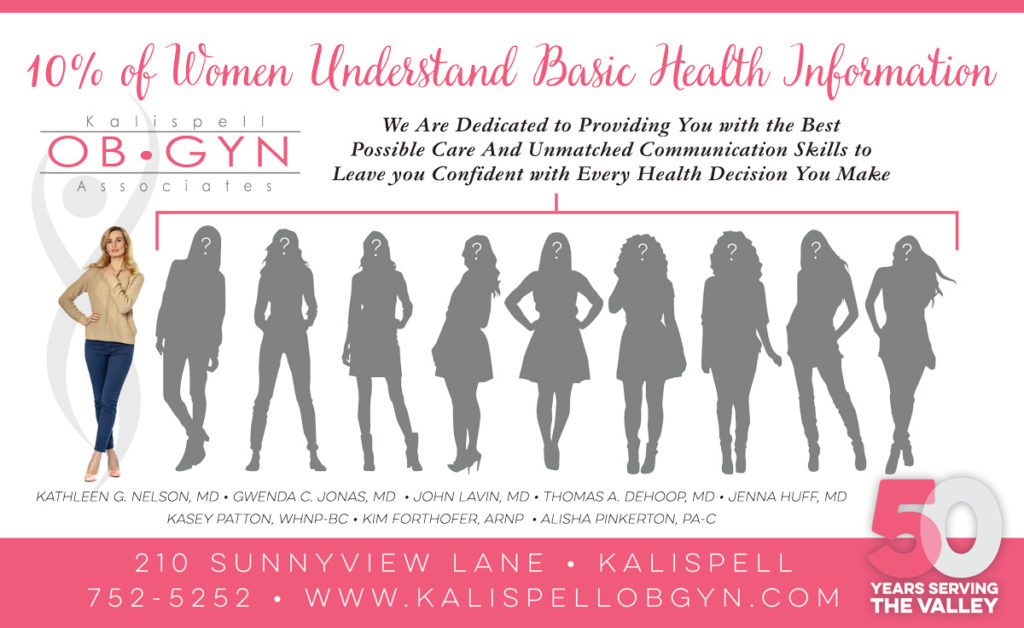Health Literacy

By Kim Forthofer, ARNP – Kalispell OB/GYN
It has been estimated that 9 out of 10 Americans do not grasp a full understanding of the information given to them during their health care visits. This can include instructions on taking a medication, information about their diagnosis, treatment recommendations, and plans for managing their health.
Think of the devastating consequences that are possible from improperly taking a medication or not understanding the need for continued monitoring of a patients’ diabetes, high blood pressure, or other chronic health problem!
Health Literacy is defined as,
“the degree to which an individual has the capacity to obtain, communicate, process, and understand basic health information and services to make appropriate health decisions”
(The Patient Protection and Affordable Care Act of 2010, Title V).
Health care is a partnership between patient and provider, and every effort should be made between the individual and the professional to make sure that there is understanding of the information conveyed to one another. There can be several factors that contribute to inadequate health literacy.
However, there are ways to improve the time spent in your doctor’s office to make sure you and your health care professional make the most of your visit.
Ask Questions
It is essential to ask questions of your health care professional. If you do not understand the information that is given to you, ask questions or better yet, ask that the information be written down. There are reputable websites that are free and easily accessible to you or your provider, an example is Medline Plus Health Information Library (www.medlineplus.gov). From here you can print information about health conditions, lab tests and more.
Additionally, the website offers videos and information that can be listened to rather than read. Your health care provider should strive to give you information in as simple of terms as possible, thoroughly explaining complicated terms, lab tests or results and procedures in ways that you are able to fully understand.
Write Things Down
Bring a list of the current medications, vitamins and supplements you take to your doctor appointment. Having a pen and paper handy during your appointment is valuable for jotting down questions and writing down information as you and the provider talk. Ideally, having an accompanying adult can help to alleviate stress, be a second set of ears to hear instructions, and to ask the questions that perhaps wouldn’t otherwise be asked. This can lead to a more thorough understanding of the information provided by the practitioner.
During College, I had an excellent professor who taught us to go through our patients’ medications one-by-one and advised us to state the medication to the person and ask why they take the medication. For example, the Nurse Practitioner asks: “I see you take Metformin. Can you tell me what you take this for?” Oftentimes, the patient can’t remember why they take the medication or when it was first administered.
We as health care professionals must do a better job of educating our patients on the medications they take and why they take them.
As people age the natural risk of disease increases, older individuals in turn have higher rates of polypharmacy (use of multiple medications at once) and are at higher risk for adverse reactions related to improper medication use.
Our health care and insurance systems are dynamic and are becoming increasingly complicated. This places older individuals at higher risk for health complications as they often have the highest health demands compounded by difficulty understanding or managing their complex health conditions.
This is why it’s important to list all the medications you take and to be honest with your provider about your health history.
As we enter into this month of love and relationships, I felt that this was a fitting subject. We should take care of and love ourselves by assuring that we are our best advocate when it comes to our health.
So, ask questions, be involved in the discussion, and know that you and your health care provider are working together towards a mutual goal — your overall health.
Kimberley Forthofer, ARNP joined Kalispell OB/GYN in July of 2013. Kimberly earned her Bachelor of Science in Exercise Science from Montana State University and worked as Physical Therapy Aide and Athletic Trainer before returning to school and earning her Master of Science in Nursing from Pacific Lutheran University. She offers a wide range of experience in primary care as well as women’s health.
